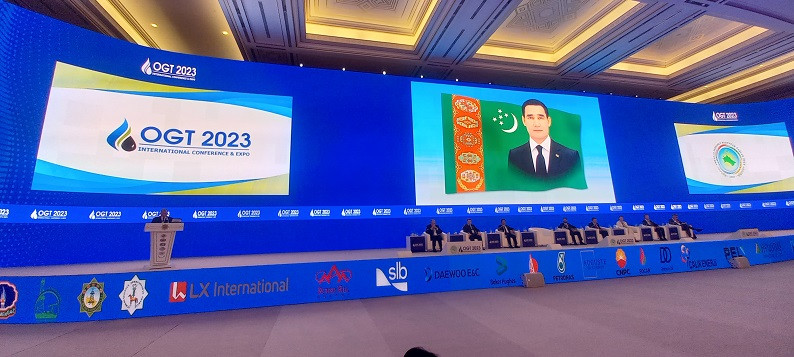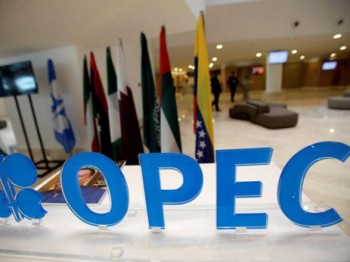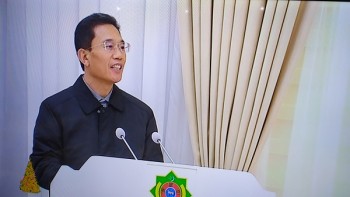TAPI gas pipeline: a project of peace and stability
22:46 27.10.2023 6761

The world today faces the challenge of reconciling three often conflicting challenges: energy security, energy justice and environmental sustainability. The TAPI gas pipeline project has the potential to make a significant contribution to the region's energy security while helping to support environmental sustainability. This topic became the main topic in the speech of the Chief Executive Officer of TAPI Pipeline Company Ltd, Muhammetmyrat Amanov, at the International Conference “Oil and Gas of Turkmenistan–2023”, held in Ashgabat on October 25-27 in Ashgabat.
As noted in the report, the TAPI project is being implemented in accordance with the Intergovernmental Agreement and the Framework Agreement on the Gas Pipeline between the governments of Turkmenistan, Afghanistan, Pakistan and India. Turkmenistan is the supplier; Afghanistan, Pakistan and India are buyers.
The length of the gas pipeline with a diameter of 56 inches will be 1,853 km: it will run from the Galkynysh gas field in Turkmenistan through the territory of Afghanistan and Pakistan to the border with India. It will transport up to 33 billion cubic meters of natural gas per year. As Amanov mentioned, natural gas for TAPI will be supplied from the Galkynysh field, the second largest gas field in the world with proven reserves of 27.4 trillion cubic meters.
The construction and operation of the Afghan and Pakistani sections of the TAPI gas pipeline with a length of 1,639 km will be carried out by TAPI Pipeline Company Ltd, a special purpose company established by the four state gas companies of the participating countries in accordance with the Shareholders Agreement.
The gas pipeline passes through five provinces of Afghanistan and Pakistan. The route was designed to avoid densely populated areas while adhering to infrastructure, and special emphasis was placed on preserving the environment and cultural heritage of the TAPI countries.
As M. Amanov emphasized, Turkmenistan considers it important to provide the TAPI countries with reliable supplies of natural gas at competitive prices, as this will contribute to peace and sustainability through economic growth; will alleviate energy poverty and help reduce air pollution by switching to clean natural gas. Ashgabat strives to make the TAPI project a reality as soon as possible to achieve these goals.
Despite the fact that since 2020 the world has been facing various challenges, we have managed to maintain the positive dynamics of the TAPI project. In light of the current circumstances in the region and in the world, we have focused on existing areas of work and project activities, Amanov said. As noted, Turkmengaz has completely built the Turkmen section of the TAPI gas pipeline, and it is currently ready for operation.
The current government of Afghanistan has accepted the validity of all existing project agreements and the progress made so far. The project company has agreed with the Afghan side on a land acquisition scheme that provides for the division of roles and responsibilities, as well as compensation mechanisms and takes into account the requirements of international creditors.
“We continue to engage with the Afghan side to review the safety measures required for the construction and operation phases of the Project in accordance with international standards,” Amanov noted, adding that the company is currently working with legal consultants and relevant stakeholders on a roadmap to reduce sanctions risks for the project.
With the support of the governments of Turkmenistan and Pakistan, in June 2023, the Turkmengas State Corporation and the Ministry of Energy of Pakistan signed a Joint Implementation Plan for the Accelerated Implementation of the TAPI Project, which gave impetus to the finalization of areas related to the Pakistan route. As a result of the signing of this document, the Project Company and the Government of Pakistan have progressed in negotiations on the full form of the Agreement with the host government. It is planned to complete work on this document by the end of 2023.
“We also continue to work on the draft Gas Transportation Agreement and the Rules for the Use of the Pipeline System, and these negotiations are also at an advanced stage,” Amanov said.
Pakistan is considering including the TAPI project in the Foreign Investment Promotion and Protection Act 2022, which would significantly reduce potential risks for international lenders. The project company and the Government of Pakistan have agreed on key principles, including roles and responsibilities, regarding land acquisition and safety measures during the construction and operation of the pipeline.
In addition to the obvious economic benefits, TAPI can also bring environmental and social benefits. In addition, natural gas, as a cleaner fossil fuel, can play a key role in the coming years in reducing energy poverty and enhancing environmental protection.
TAPI can significantly reduce CO2 emissions during transportation compared to the same amount of energy for LNG. This project will help meet commitments to reduce greenhouse gas emissions by using natural gas as a transition fuel. It will help reduce pollution caused by lack of access to clean cooking fuels, which also poses a significant health risk in Afghanistan, Pakistan and India, Amanov noted.
“Our project can help reduce energy poverty in Afghanistan, Pakistan and India by introducing inexpensive, readily available energy that can help reduce greenhouse gas emissions,” said the head of TAPI Pipeline Company Ltd.
He recalled that natural gas is a cleaner source of energy compared to other fossil fuels and can be used as a transition fuel for many years while more sustainable energy sources are researched and developed. One such sustainable alternative is hydrogen, which can be produced from a variety of domestic resources with the potential to achieve near-zero greenhouse gas emissions.
As Amanov emphasized, Turkmenistan supports the use of alternative energy sources and the introduction of new, environmentally friendly energy production technologies. At the beginning of 2022, the President of Turkmenistan signed a Resolution in which he approved the Roadmap for the development of international cooperation of Turkmenistan in the field of hydrogen energy for 2022-2023. If necessary, the TAPI gas pipeline can deliver a mixture of natural gas and hydrogen.
Thus, the project company has made significant progress, despite delays due to a number of external events, Amanov noted. The project's business case remains strong: there is high demand for TAPI gas in Pakistan and India, and Turkmenistan can supply it at an attractive price.
“There is no doubt that the TAPI project will help reduce CO2 emissions, achieve the goals of the Paris Agreement and further increase environmental sustainability in the TAPI countries,” the head of TAPI Pipeline Company Ltd is convinced.
He noted that ensuring energy security can go hand in hand with sustainable development, as we strive for a future in which our energy needs are met in a reliable and affordable manner, while reducing our impact on the environment.
At the end of his speech, the head of TAPI Pipeline Company Ltd quoted President Serdar Berdimuhamedov: “We are carrying out great systematic work to develop the oil and gas industry and diversify routes for transporting natural gas to foreign markets. In accordance with the state energy strategy, the hydrocarbon potential of our country is realized in the interests of the people of Turkmenistan and other peoples of the planet. The practical measures taken in this direction are yielding positive results”.

OPEC will be headed by a representative of Kuwait from August
At an extraordinary meeting of OPEC, the ministers elected a new secretary general of the organization – from August 1, 2022, Haitham Al-Qais from Kuwait was elected for a period of three years, Interfax reported.

Issues of intensifying economic cooperation between Turkmenistan and Saudi Arabia were discussed
On the instructions of President Serdar Berdimuhamedov, on November 16, a meeting was held on the digital system of the Vice-Chairman of the Cabinet of Ministers of Turkmenistan, in charge of the fuel and energy complex, Batyr Amanov, with the Minister of Investment of the Kingdom of Saudi Arabia, Khalid Al Falih, at which issues related to the further development of relations were discussed, TDH reports.

An industrial influx of “blue fuel” has been obtained at new wells in gas fields of Turkmenistan
Workers of the State Concern “Turkmengas” and the State Corporation “Turkmengeology” of Mary region celebrate the Day of Neutrality of Turkmenistan and the upcoming professional holiday of workers in the country’s oil and gas industry with significant labor successes.

Over 320 billion cubic meters of Turkmen gas supplied since the start of operation of the Turkmenistan-China gas pipeline, – CNPC
Since the opening of the transnational Turkmenistan-China gas pipeline in 2009, over 320 billion cubic meters of Turkmen gas have been exported to the Celestial Empire. General director of the branch of the National Petroleum Corporation of China (CNPC) Chen Huailong stated this, the Watan news program of the Turkmen television reported.

Turkmenistan is one of the three leaders in the supply of gasoline to Uzbekistan
In January-November 2021, Uzbekistan imported 141.2 million liters of motor gasoline from Turkmenistan. This was reported by the State Statistics Committee of Uzbekistan. Thus, Turkmenistan ranks second in the supply of motor gasoline to the neighboring country.
